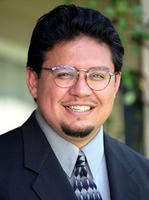 Rudy Carrasco
Rudy Carrasco
Bio: Rudy Carrasco is the executive director of the Harambee Christian Family Center in Pasadena, California. A writer by training, his articles have appeared in the Los Angeles Times, Christianity Today, Religion News Service, the Pasadena Star News and other publications. He is a 2006 contributor to the Christian Vision Project. In 2002 Rudy was inducted into the Hispanic Scholarship Fund's Alumni Hall of Fame. In May, 2001 he joined a group of nine Hispanic religious leaders from around the country who advised President George W. Bush on the faith-based initiative. In 1996 Rudy was selected as One of 50 Leaders Under The Age Of 40 To Watch by Christianity Today. He serves on the board of directors of World Vision, the Christian Community Development Association, and TechMission.
Site: Harambee Ministries
Blog: Urbanonramps.com
The Leadership Blog Interview Questions
1. What gives you the greatest joy in being a leader?
Rudy: "I love it when people in my circle of influence get a new perspective on an existing situation. For example, race remains a big issue in America, and we need new ways of thinking about it that go beyond black and white. Well, going beyond black and white is easier said than done. But it's possible,and in my experience it requires being interdisciplinary about race. For example, when examining race and poverty, I often find that a given situation has much less to do with race and much more to do with general poverty that afflicts people of all cultures and nationalities. And that's one way to make progress in race relations,by recognizing that the core of every problems is not necessarily racial.
It is a challenge for existing urban and multiethnic leaders to think in fresh ways about race, because racism continues to be an issue thatwe, as leaders and pastor in urban contexts, feel the most. But if we don't get fresh perspectives, we'll burn out from hopelessness. So I get great joy when other begin to "think outside the box" when it cometo race. I could say this about other areas, too: Economics. Ministry to the Poor. Cross-cultural. etc."
2. What is your biggest pet peeve as a leader?
Rudy: "Related to #1, my biggest pet peeve is when people in leadership do not approach an issue from an interdisciplinary point of view. I used to just feel like I was about to waste a lot of time with someone who"didn't get it." Now I realize it's just ongoing work to encourage one another to think in a more complex ways about issues. By "more complex" I don't mean "many good solutions" or "everyone has a valid point" or other such equivalizations. I mean that the solution is not always obvious, so you have to keep looking under rocks (so to speak), and in some unlikely places, to find that single solution."
3. Who made the biggest influence in your life as a leader?
Rudy: "Dr. John Perkins. I was his assistant for three years. I walked where he walked, sat in on private meetings, drove around with him, traveled with him. I spent a lot of "unofficial" time with him. That allowed me to learn from what he did, not just what he said and wrote. I had an innermost window into his life, and I could see his integrity, heart,and vision for myself. He convinced me with his actions, and his wordsgave structure and clarity to those actions. I try to do the same withthose in my circle of influence."
4. What books have changed your life?
Rudy: "Eat The Rich by P.J. O'Rourke - This helped me to think in an interdisciplinary way about economics and the poor The Mystery of Capital by Hernando de Soto - ibid, The Great Divorce by C.S. Lewis - It's a fantasy book, but gives me theological constructs in which to think about the role of choice inour eternal destiny.
5. What's your biggest challenge as a leader?
Rudy: "Communication. I'm learning the hard way how critical it is to simply communicate with your people."
6. What goals do you have as a leader?
Rudy: "For those in my circle of influence to gain, for themselves, the same tools that help me in my leadership."
7. Where do you see yourself in ten years?
Rudy: "Ha! Trick Question! Stealth Question! Uh, uh --- I have no good answer. No matter what I'm doing, I hope I'm writing books and magazine articles and newspaper op-eds and doing web interviews."
Thanks Rudy for taking time for the interview, you're doing a great work.
Wednesday, October 05, 2005 | Posted by Joshua Sargent at 3:00 PM |